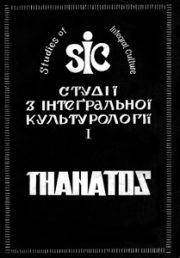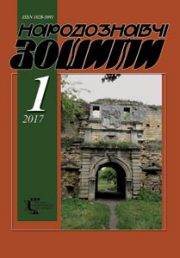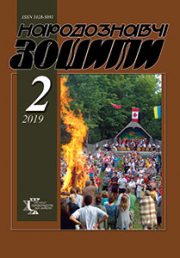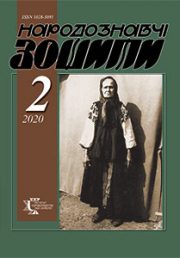The Ethnology Notebooks. 2019, № 3 (147), 548—556
UDK 930.2:[37.01:27-725](477.83/.86)”189/19″
DOI https://doi.org/10.15407/nz2019.03.548
SAPELYAK Oksana
ORCID ID: https://orcid.org/0000-0001-8111-6563
Candidate of Historical Sciences
Senior Researcher at the Institute of Ethnology
of the National Academy of Sciences of Ukraine,
Department of ethnology, active member of the Shevchenko Scientific Society
Lviv-Center, Svobody Avenue, 15,
79000, Lviv, Ukraine
Contacts: е-mail: oksana.sapelyak@gmail.com
Abstract. Significant role in the Ukrainian cultural space at the end of XIX — beginning of XX centuries is played by the clergy of the Ukrainian Greek Catholic Church. In particular, it was active formation of national consciousness in the cities and villages of Galicia in the field of schooling and education. In the twentieth century in Ukrainian science that question was not raised at all because such topics were not studied and could not be studied at the time of the atheistic ideology of the USSR state and totalitarian regime, which controlled all scientific products. Therefore, the problem was raised during the present revival of the Church, the need for a new vision of the historical past of Ukraine and its national-cultural development is particularly relevant today. In this article the author set the goal to find out one of the important pages of that period and a special role in the complex process of creating the national and cultural space of the clergy of the Ukrainian Greek Catholic Church. The object of the research is the influence of the clergy in Galicia at the turn of the XIX—XX centuries on the development of Ukrainian schooling and education, and the subject is publications in the socio-political and economic journal «The Flag», which was published in Przemysl (1897—1900) for Ukrainian clergy, aimed at educating of conscious national Ukrainians. The methodological basis of the research is the principle of historicism, analysis and use of basic methods of ethnological science. The magazine «Flag» has never been the subject of ethnological studies. The activity of the prominent figure in political and public life of the region, the cooperative movement, the founder of the first Ukrainian credit company Vira, Shchednitsa Bank, co-founder of a number of economic institutions in the Przemysl and Lviv, the famous lawyer Theophil Kormosh as the editor of the «Flag» has never been studied before. Therefore, the basis of the presented work is the publications of the magazine «Flag».
Keywords: education, schooling, clergy, public, magazine «Flag», Theomel Koromosh, «folk politics», intelligent, social and cultural life, people.
Received 22.04.2019
REFERENCES
Franko, I. (2010). Ukrainian literature and science in 1899 (Vol. 54, pp. 245—250). Kyiv [in Ukrainian].
Since 1899. (1899). Prapor (P. 1, pp. 1—2) [in Ukrainian].
Etyks in everyday life. (1899). Prapor (P. 4, pp. 97—101) [in Ukrainian].
Encyklopedjia of Ukrainian studies. (1994). Teofil Kormosh (Vol. 3, pp. 1137). Lviv [in Ukrainian].
Andrusyak, T. (2009). Teofil Kormosh — notable ZUNR. Ukraine: cultural heritage, national consciousness, statehood: Collection of scientific works. (Issue 18, pp. 482—489). Lviv: Instytut Ukrayinoznavstva im. I. Krypjakevycha NAN Ukrayiny [in Ukrainian].
Stepova, I. (2014). Book series «Paraxijilna Biblioteka» (1897—1899): book research analysis. Visnyk Lvivskoho universytetu. Series of bibliographic and information technologies. (Issue 9, pp. 13—52). Lviv [in Ukrainian].
Korenec, D. (1942, 2 Dec). To the 15th anniversary of death of dr. Teofil Kormosh. Krakovski visti [in Ukrainian].
The voices of the Clergy. (1899). Prapor (P. 4, pp. 121—122) [in Ukrainian].
Will the price be punished? (1899). Prapor (P. 9, pp. 268—273) [in Ukrainian].
How to build the Polish temples in Ukraine? (1899). Prapor (P. 9, pp. 273—286) [in Ukrainian].
Educate a large number of intellectuals (1899). Prapor (P. 7, pp. 193—209 [in Ukrainian].
You need to know (1900). Prapor (P. 2, pp. 57—59) [in Ukrainian].
Szeptyckyj, A. (2007). Pastoral Epistle of the Bishop to the Faithful «The first word of the shepherd». Mytropolyt Andrej Szeptyckyj. Dokumenty i materially 1899—1914. Pastyrski poslannya 1899—1914. (Vol. I, pp. 3—18). Lviv [in Ukrainian].
Sisters of the monastery and broszure «Ulrainian Women and their Duties». (1899). Prapor (P. 7, pp. 213—218) [in Ukrainian].
Ukrainians close the road to higher education. (1899). Prapor (P. 9, pp. 276—281) [in Ukrainian].
Mariya Dobroniha Volodymyrivna (daughter of st. Volodymyr). (1899). Prapor (P. 3, pp. 87—91) [in Ukrainian].
Religious and social relations of the princely court in the XI th century. (1899). Prapor (P. 5, pp. 135—138) [in Ukrainian].
To the studios of our past. (1899). Prapor (P. 2, pp. 52—53) [in Ukrainian].
Sapelyak, O. (2000). Ethnographic studios in the Shevchenko Scientific Society (1898—1939 rr.). Lviv: Instytut Narodoznavstva NAN Ukrainy [in Ukrainian].
Priest in the reading room. (1899). Prapor (P. 2, pp. 45—48) [in Ukrainian].
Kolba, V. (1910). How to attract more members of the society «Prosvita». Perszyj prosvitnyo-ekonomichnyj konhres. Lviv: Prosvita [in Ukrainian].
Announcement of the terminaton of the «Parich Library» publication. (1899). Prapor (P. 4, pp. 122—127) [in Ukrainian].







